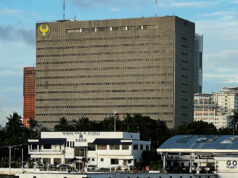Stimulating growth in the regions
MANDAUE CITY — With 10 days to go before the midterm national and local elections, there is growing concern about the power situation on May 13 following the series of rotational brownouts and “red alerts” triggered by recent earthquakes that rocked Zambales, Eastern Samar, and Surigao del Norte as well as the ongoing El Niño weather phenomenon.
The Department of Energy has reportedly pushed for the declaration of May 14 as an additional holiday to ensure brownout-free counting and tallying of ballots cast by an estimated 75% of the 62 million registered voters based on data from the Commission on Elections (Comelec).
This would ensure the easing of electricity demand while election results are still being finalized. Reliable power supply is crucial in upholding the integrity of ballots, since the voting and counting processes are done electronically. The Comelec has assured Filipinos that the 12 winning senatorial candidates will be proclaimed by May 27 while local election winners would be known within 24 to 72 hours.
An honest and credible election is necessary for the Philippine economy to continue growing and to maintain its high credit rating. Last month, S&P upgraded the country’s debt rating to an all-time high of BBB+ or two notches above the minimum investment grade, on the back of “consistent economic growth, solid fiscal accounts, and good position in the external environment.”
Meanwhile, political allies turned foes are contesting the top positions in this highly urbanized city, known as the industrial capital of Central Visayas with about 40% of Cebu’s export companies domiciled here. Mandaue City hosts more than 10,000 commercial enterprises, including the San Miguel Brewery, the Shemberg carrageenan manufacturing plant, and the Cebu International Convention Center.
It is also home to Arctura Petroterminal, a 4.3-hectare special economic zone with an offshore berthing facility strategically located along the Mactan Channel, a major shipping lane for international and domestic bulk carriers. Arctura’s bulk terminal and jetty facility caters to the storage and delivery needs of petroleum and liquid chemical industries in central and southern Philippines.
Independent oil and gas companies maintain their storage tanks in Arctura. The latest to operate there with its own dedicated jetty is South Pacific, Inc. (SPI), the country’s third biggest liquefied petroleum gas (LPG) firm whose main terminal is located at the Calaca Industrial Seaport in Batangas.
SPI’s two terminals have a combined capacity of 22,000 metric tons, equipping the LPG importer to have the largest storage facility in the Philippines. Bigger storage translates to economies of scale and enables the company to import products at a lower price.
“Our growth will come from the Visayas-Mindanao market. We plan to build six or seven more terminals in Iloilo, Bacolod, Tacloban, Cagayan de Oro, Davao or General Santos, and Zamboanga,” SPI President Inigo Golingay said.
At present, SPI’s LPG cylinders are loaded at the Arctura terminal-cum-jetty and delivered to smaller islands like Bohol and Romblon via its own shipping vessels using tank containers built to International Standards Organization specifications.
Mr. Golingay believes that LPG is a catalyst to stimulate growth in the country’s main islands because it is the more environment-friendly option and relatively cheaper per unit cost compared to firewood and charcoal. The Philippine LPG market has reached at total of 1.75 million metric tons annually, of which SPI had a market share of 14% in 2018 and is targeting 16-18% this year.
“Our cost is lower because we receive refrigerated products in bigger parcels, so the volume is bigger when it is cold inside. We are building terminals in the main islands to bring down costs. In other places, we will use ISO tanks as big as 20-footer container vans. We also invested in a marine loading arm to make operations safe and efficient,” according to Mr. Golingay.
Among Filipinos, LPG market penetration has remained at 30-40% due to issues of accessibility and purchasing power. Thus, the challenge for SPI is to penetrate the Visayas and Mindanao regions through competitive pricing and reliability of supply in its quest to capture the top two ranking in the LPG industry.
J. Albert Gamboa is CFO of the Asian Center for Legal Excellence and Chairman of the FINEX Golden Jubilee Book Project.



